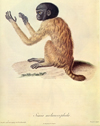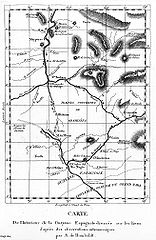Meeting 12 • 13 February 2014
|
Version: |
|
pictures of the week
|
|
|
|
mini-text of the week (start): "In this interior of a new continent you get used to seeing man as not essential to the natural order…"Humboldt, "Personal Narrative", from Jaguars and Electric Eels, ed. & trans. Wilson, pp. 99 (read more) |
|
•√ (10') This week's thought-bite: the constant measuring and the tiny gradations; Lewis & Clark and the Willamette; science shows that Kansas is as flat as a pancake. Request about keeping small-group discussion down to a loud roar and then quieting back down for full-group learning. Groups do quick estimates / calculations and then report: How flat (even) is the surface of the Earth compared to an orange? How thick is the atmosphere compared to the peel of the orange? Followup about words for "science", "scientist", and the specific sciences: "physico-mathematicall experimentall" (Bryson, book about Royal Society). Sources of information about: the history of words – the Oxford English Dictionary (OED); and the state of knowledge "back then" (=1800) from its own perspective – The Encyclopédie (1751-1772) of Diderot & d'Alembert (Wikipedia; • complete French text in e-facsimile • PSU has it as ink-on-paper facsimile) |
|
•√ (10') My recent reading: a) what geology and paleontology tell (and don't [yet] tell) us about climate change as much as a billion years ago; b) editor of skiing mag pushes for more attention to global warning (NYT article "The End of Snow" by Porter Fox). How far are we ourselves qualified to judge the science, and how far must we take the "facts" and "data" on "faith"? |
|
•+ (15') triangulation, including hands-on measurements of distances, heights, etc. Concept of on-demand vs. curriculum-embedded learning. Pre-Egyptian principles / tools / standards: height of vertical structure (tree, building); distances on the ground, especially in rough territory; why fiddle with barometers to measure the height of a mountain when all that nice trigometry is available? |
|
•N (10') An example of a very different course / project that relates to sustainabilty (and distant lands), and also illustrates how valuable are having many different kinds of knowledge / kills, and also teamwork and individual initiative |
|
•√ (05') About reading: allocating time, streamlining what you read, taking (mental) notes |
|
•+ (10') Let's support the midterm by looking at AvH pics - the ones that have been on every meeting outline. Check your progress – and explore the related issues of standards, assessment and grading by exploring this self-evaluation guide for the middle of the term; this applies to your recent writing assignment, to your performance in the course, and to your larger roles as citizen and (possibly) parent. |
|
•N (05') Prep for species descriptions, group projects, and even the book review activity: What about AvH's life and work might spark interest in: 1) AP students of various subjects; 2) middle-/high-school boys, especially non-privileged/minority learns (and especially ones that have unduly high self-images); 3) elementary school girls; 4) special-needs learners; 5) school teachers and administrators; 6) communities that could be linked to H? |
|
• (0') Use your computer/ smartphone map links and applications to trace AvH's route in South America, starting with his travel up the Orinoco and down the Amazon. See Helferich, p. 52 map, but be aware that some place names have been changed over time. Looking further ahead (projects, etc.): presentation (continuation) about educational standards and their parts in the course: 1) Improving your learnign by helping others to learn - how standards are used to develop curriculum (curricula?) and learning activities. Example of source of lesson plans; article (H0152) "School Gardens Blooming Teach Lessons On Nutrition, Environment, Science, Teamwork". This is preparation for assignments about species description and group projects. looking ahead: presentation of project ideas (just the ideas, not finished projects) in week •• Later: what it's like to read Darwin; Humboldt-named species; forming teams and scoping out projects (ideas for group projects); the iconic graphic of Chimborazo; apps Humboldt would have liked; what shall we do with (to??) the people who haven't revealed their interests and strengths and don't get "on board" when they're needed? |

